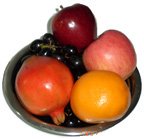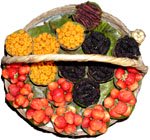Fruit nutrition facts
 Welcome to the fruit nutrition page.
Welcome to the fruit nutrition page.

Why fruits?
Fruits are nature’s wonderful gift to the mankind; indeed, they are life-enhancing medicines packed with vitamins, minerals, anti-oxidants and many phyto-nutrients (Plant derived micronutrients). They are an absolute feast to our sight, not just because of their color and flavor but for their unique nutrition-profile that help human body free from diseases and keep it healthy!
Here is an impressive list of fruits with complete illustrations of their health benefits and nutrition facts:
-
Fruits are low in calories and fat and are a source of simple sugars, fiber, and vitamins, which are essential for optimizing our health.
-
Fruits provide plenty of soluble dietary fiber, which helps to ward off cholesterol and fats from the body and to help in smooth bowel movements as well as offer relief from constipation ailments.
-
Fruits compose of many anti-oxidants such as poly-phenolic flavonoids, vitamin-C, and anthocyanins. These compounds, firstly, help human body protected from oxidant stress, diseases, and cancers, and secondly; help the body develop capacity to fight against these ailments by boosting our immunity level. Many fruits, when compared to vegetables and cereals, have very high anti-oxidant values, which is measured in terms of their "Oxygen Radical Absorbent Capacity" or (ORAC).
-
Anthocyanins are flavonoid category of poly-phenolic compounds found in some "blue-fruits" like blue-black grapes, mulberries, acai berry, chokeberry, blueberries, blackberries, and in many vegetables featuring blue or deep purple pigments. Consumption of fruits rich in blue pigments offers many health benefits. These compounds have potent anti-oxidant properties that help remove free radicals from the body, and thus offer protection against cancers, aging, infections, etc. Majority of these pigments in the fruits tend to concentrate just underneath their skin.
-
Fruit’s health benefiting properties are because of their richness in vitamins, minerals, micro-nutrients, pigment anti-oxidants. Altogether, these compounds help the body prevent or at least prolong the natural changes of aging by protecting from damage and rejuvenating cells, tissues, and organs. Their overall benefits are manifold! Fruit nutrition benefits are emormous! Including fruits in daily diet, you are protecting yourself from minor ailments like wrinkling of skin, hair-fall, and memory loss to major ailments like age-related macular degeneration (AMRD) of the retina in the eyes, Alzheimer’s disease, colon cancers, weak bones (osteoporosis)…etc., and the list of fruit nutrition benefits simply never ends!
Research studies suggest that one may eat any servings of fruits daily. It is recommended to eat at least 2-3 servings of fresh fruits every day.
The term, "one fruit serving" is about 250 g of cleaned, edible-portion of the fruit, excluding discards like peel, seeds, etc.
Include seasonal fruits in the daily diet. Variety of fruits type, color, and flavor should be encouraged to get maximum health benefits. Yellow and orange color fruits are rich sources of a and ß carotenes, zea-xanthin and crypto-xanthin, while blue, black colored like black or blueberries are a good source of poly-phenolic anthocyanin anti-oxidants.
Selection of fruits
To avail maximum fruit nutrition benefits eat organic produce. Many "wild" varieties of berries and "tropical tree" fruits have still not treated with any kind of fertilizers or chemicals and can be readily purchased from local farm owners. Organic fruits tend to be smaller; however, they feature special flavor and richness in vitamins, minerals and stuffed with numerous anti-oxidants.
In the store, however, choose fruits that feature freshness, bright in color and flavor and feel heavy in your hands. Look carefully for blemishes, spots, molds, and signs of insecticide spray. Buy whole fruits instead of section of them (for example, buy a small size watermelon instead of a section of big size melon).
Dry fruits
Dry fruits are rich source of nutrients such as vitamins and minerals. Consumption of some dry fruits daily enhances the overall bioavailability of nutrients. Try raisins (dried grapes), apricots,dates, figs, tamarind..., which are indeed very good in iron, calcium, zinc, selenium and manganese. In addition, mixing dry fruits with some fresh fruits would help you get vitamin C which in-turn facilitates complete absorption of iron inside the stomach.
How to use fruits?
Barring few fruits like wild-berries, try to wash them soon after shopping. Rinse them in salt water for a few minutes and then wash in cool running water until you are satisfied with complete cleanliness. This way, you make sure that the fruit you eat is rid-off dirt, sand and any residual chemical spray. Eat them while they are fresh, since certain fruits have very short shelf life and their health benefiting properties decline with time. If you need to store them, place them in plastic wrappings or in zip pouches to keep them fresh for short periods until you use them. Eat fruits as a whole without any additions to enjoy their true flavor, taste, and to get maximum fruit nutrition benefits.



